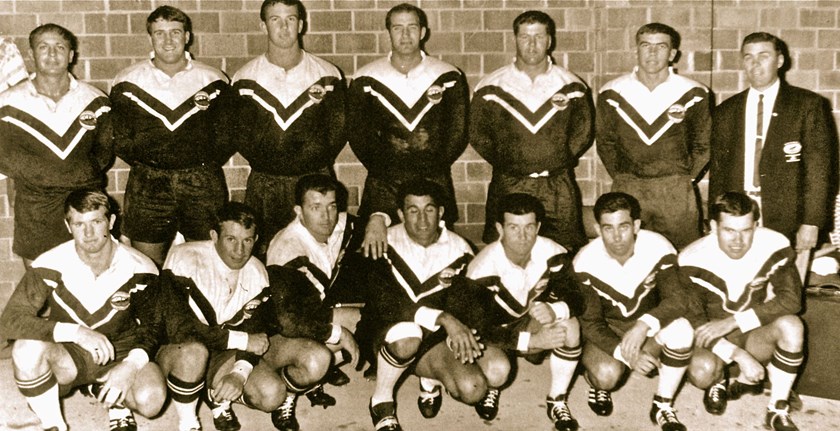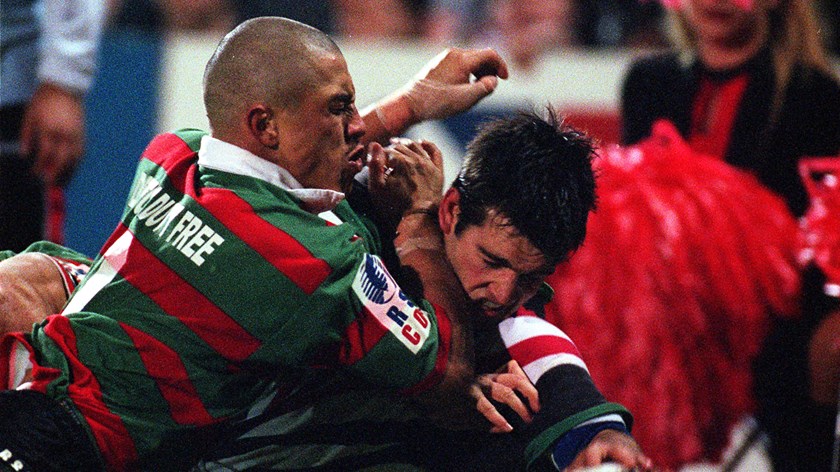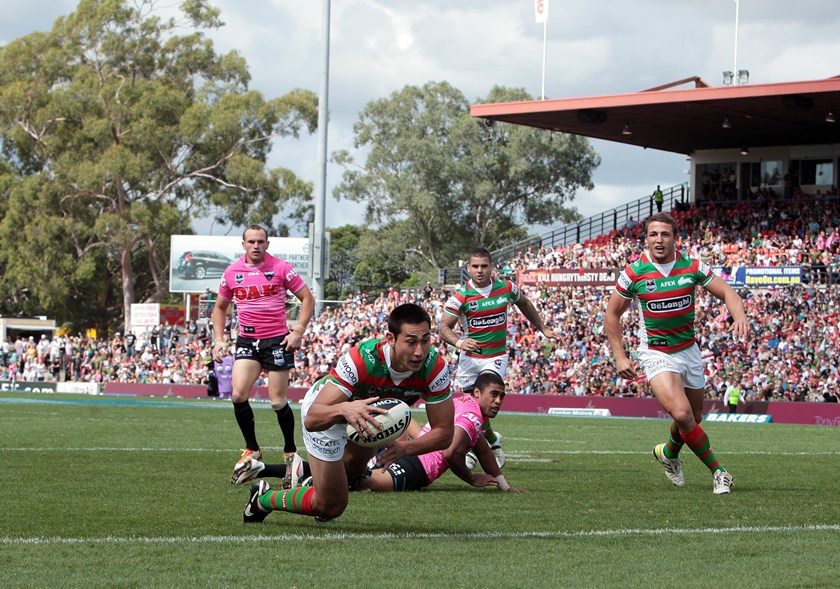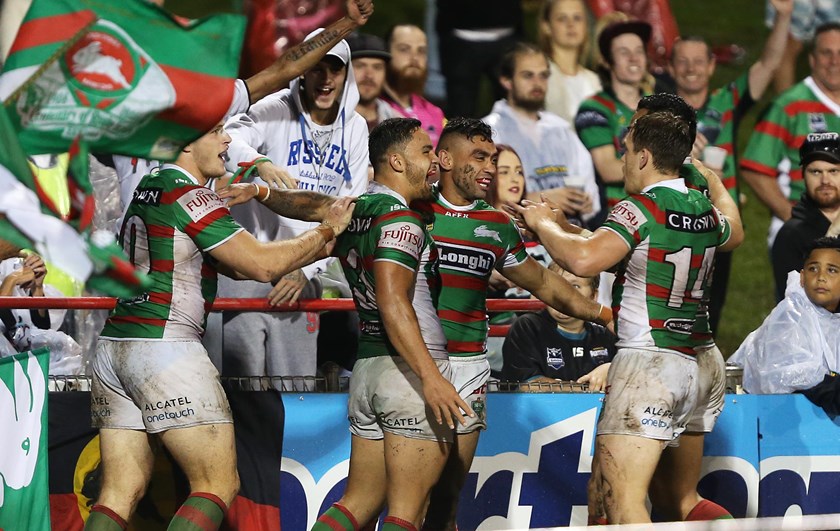The thing that needs to be said about the rivalry between the South Sydney Rabbitohs and the Penrith Panthers is that the two clubs have a very obscure relationship highlighted by erratic and unexpected results. We’ve had their measure more often than not, although they have upset some highly successful Souths teams, and clashes over the years have often been pivotal to the overall success or failure of our season.
Penrith played in the Second Division competition until they were promoted, along with Cronulla, to the NSWRL First Division in 1967. Penrith chose to adopt a brown and white combination but their colours somehow seemed to hold them back. They became known as the ‘Chocolate Soldiers’ and gained an unwanted reputation as perennial losers.

Penrith's ability to spring occasional upsets was foreshadowed in their very first season, 1967. Although we smashed them 39-0 the first time we met, they held us to 14-7 in the second round at Redfern on our way to the Premiership, and beat us 13-12 at Redfern in 1968. Not only that, but we failed to get the points on two other occasions during our most recent golden era, being held to an exciting 18-18 draw at Penrith in 1970 and losing 12-5 at Redfern in 1971.
As Souths' fortunes fell during the mid '70s, Penrith - despite never rising to any great heights themselves - shaped things for us on a couple of crucial occasions. We finished fourth in 1972, just missed the semi-finals in 1973 and squeezed into fifth place in 1974 before going out in the first week of the play-offs. Nevertheless, Souths was buoyed at the beginning of 1975 by the return of tough-as-teak prop John O'Neill from Manly and elusive centre Bobby Honan from a premature retirement.
The season started well, with a couple of early wins before a match against the Panthers in Round 4 at Redfern. In a game the Rabbitohs were expected to win easily, we fumbled and bumbled our way through, only to be saved by a one-man band performance from fullback Eric Simms. Simms scored both Souths tries and kicked four goals from four attempts to sink the mountain men 14-9, but our failure to dominate did not bode well for the season.
After winning the following week, we hit the skids badly, losing eight of the next nine games before meeting Penrith again. We went down 9-7 at Penrith Park in a mistake-riddled match where Simms again scored all of our points, with a try and two goals. That defeat seemed to break whatever remained of the team's spirit that season, and we lost all but one of the remaining games to finish last for the first time since 1946.
No Souths fan who was there will ever forget our ill-fated visit to Penrith Park during the wretched 1977 season. Penrith had a bad year as well and was only one spot ahead of us on the table, but you'd never have known it that day. After an early penalty goal put us in front 2-0, we conceded nine tries and were unceremoniously flogged 43-2. Strangely though, it was a day that triggered events which would result in a return to more successful times in the early '80s.
Following the thrashing at Penrith, coach John O'Neill contacted legendary mentor Jack Gibson to ask for assistance, the association leading to somewhat improved performances for the rest of the year, but also resulting in Gibson agreeing to coach Souths for the next two seasons. Although we failed to make it to the semis in either 1978 or '79, the club had turned the corner from the disastrous days of the mid-'70s, and the change came about as a direct result of that very long, embarrassing afternoon at Penrith Park in July 1977.
In 1980, both games against Penrith had a big impact on the season. We won only two of the first six games that year before the Panthers came to Redfern. On another day every Souths fan remembers, Souths went mad, scoring 13 tries in a display of champagne attacking football not seen from a Rabbitoh side for years. Props John Peek and Peter Tunks got four tries between them but the rest were scored by the backline with crowd favourite wingers Ziggy Niszczot and Terry Fahey getting five between them and centre Gary Knight another three. It was a fantastic day with the hapless mountain men simply run off their feet. The 59-5 cavalcade really boosted the Rabbitohs' self-belief and we soon set off on a four-match winning streak that had us within striking distance of the top five. However, after a nail-biting 6-6 draw with Cronulla at Redfern, Souths fans feared the streak was over as they headed to Penrith the following Sunday.
The Panthers season had, by this stage, been well and truly consigned to the dustbin, with just one win and a draw from the 17 games played, yet they very nearly ended our run then and there. Penrith controlled the game, leading 12-8 at halftime and 17-12 with 15 minutes to go. Five-eighth Rocky Laurie, who that season went on to win the inaugural Dally M Player of the Year, sliced through from a scrum before setting up teenage lock Shane Arneil for an equaliser. After the draw the previous week it wasn't enough. We had to win every match to stay in the race for the finals. With just two minutes left, captain Nathan Gibbs made a bust and passed inside to rampaging centre Gary Wright, who crossed for the winner. It had been an exhausting, heart-stopping victory which once again kick-started the charge. The Rabbits won the next three games and squeaked into fifth place and our first semi-final appearance for six years.
During the '80s we generally got the points against Penrith, but the fact we can never take any match against them for granted was again proven in our two most successful years of that decade. In 1986, when we led the competition right up to the final home and away round, Penrith won 11-8 at Redfern. Then, in 1989, we won every single away game and won the minor premiership by a country mile, along the way stringing 12 victories in a row to break the club record. The 13th game was against Penrith at the Sydney Football Stadium, and they broke the streak, upsetting us 19-8.
From 1988 to 1998, we only managed a single victory against Penrith, but in 1999, we once again found our destiny jammed right up against the foot of the mountains. Twice! Throughout that year, Souths played against the backdrop of possible extinction, with the media constantly full of stories about the Rabbitohs imminent exclusion from the competition. On the field, the team fought a brave rearguard action, staying well in the hunt for a finals berth. In Round 17, we headed to the mountains on a freezing July Saturday night, knowing that a loss would just about put paid to the season. That night is best remembered for the duel between lifelong mates Mark CarrolI and Mark Geyer, who as kids were opposing five-eighths in the Penrith junior league. 'Spudd' took on 'MG' as though his life depended it, and an inspired Rabbitohs won 20-0.

It was, perhaps, the best performance of that tumultuous year, which ended in October with the release of the infamous criteria rankings. South Sydney, The Pride of the League, was kicked out of competition we had won 20 times.
Second last on that contentious table, and therefore taking the 14th and last spot in the revised competition, was Penrith. Controversy later raged as arguments about whether monies paid to Souths and Penrith should have been counted as 'grants' or 'sponsorship', but it didn't matter when the 2000 competition kicked off.
The Chocolate Soldiers, with only 33 years of history and just a single Premiership, were in. And we were out.
But revenge would be ours. A 23-16 victory in our first match against them since rightfully returning to the NRL in 2002 was a highlight in an otherwise downer of a season. It was a particularly memorable win, especially after trailing 10-0 at half-time.
The Panthers continued to haunt us in the early parts of the 2000s although we’ve had a couple great wins over them. In 2006, we beat them 32-26 on a fabulous afternoon at Telstra Stadium. Nathan Merritt scored a hat-trick to wrap up the top try scorer spot for the season, a feat made so much more remarkable by the fact that we only won three games all year.
Then, on a night of torrential rain and gale force winds in June 2007, we faced Penrith in a critical match at Telstra Stadium. Paul Mellor scored in the fourth minute and David Peachey in the 75th as we ground out a superb 14-4 victory. Yet just eight weeks later the Panthers, running stone motherless last, surprised us at the foot of the mountains, winning 32-16. That game, along with so many others in our strange and uneasy history with Penrith, proves that we can never, ever, take a result against them for granted. In the middle of some of our darkest seasons, we've somehow been able to jag the points. And when we have been riding high, they have been able to ambush us.
But Penrith’s ability to dictate our fortunes had no more bearing than in Round 24 in 2010. With our season on the line and already having disposed of the Panthers 42-22 in Round 12, we arrived in Penrith on the verge of breaking into the top eight, while our opponents were riding high in fourth position.
The Panthers piled on three tries in the first ten minutes, leading 16-0. And there was to be no respite. At half time, the scoreline read 40-0. It was the worst half of Rugby League a Rabbitoh team had ever laid on. We finally struck in the 57th minute through fill-in five-eighth Luke Capewell, and again through Rhys Wesser and Dylan Farrell, but the damage was done as the Panthers pounced in the last 10 seconds to bring up a half century. It was a very, very long trip home down the M4. It remains as their biggest score against us.
Our meeting in Round 3, 2012 will be remembered as a match that would change the dynamic of our team, and be the turning point in our history against Penrith.
In Michael Maguire’s first season with the clipboard in hand, we lost our first two matches to the Sydney Roosters and Melbourne Storm, and found ourselves in Penrith with both sides looking for their first victory of the season. Maguire had made one significant change to the side from previous weeks. He moved superstar centre Greg Inglis to fullback. At the time, it might have been seen as a risk. In hindsight, it was a stroke of true genius.
The opening highlights would belong to 25-year-old debutant Andrew Everingham. He scored with his first touch of the ball after Matt King appeared to have broken the line, but threw a no-look flick pass that landed in the winger’s arms as he fell over the line. The good times continued with tries to Roy Asotasi and an unbelievable Dave Taylor effort helping us to a 22-12 half-time lead.

Inglis’ move to the back was reaping rewards in the opening minute of the second stanza, as he scored a game-changing try, trampling over Panthers fullback Lachlan Coote and carrying halfback Luke Walsh over the line in a display of sheer destruction. It was the moment that ‘GI’ had announced himself as the South Sydney Rabbitohs’ custodian, a position that he has held ever since.
Although the Panthers attempted to mount a comeback, we ran away 40-22 in a game that kick-started our 2012 campaign, which saw us reach the top four for the first time in over two decades. Since Inglis’ move to the back, we have enjoyed a 7-2 record against the Panthers.
One of our most complete and history-making performances came against the Panthers in Round 6 of the 2014 season. On a rainy April night at the foot of the mountains, we enjoyed a night full of milestones while coming away with a famous 18-2 victory. Despite a close half that saw the two sides each kick a penalty goal, centre Kirisome Auva’a, who was a late inclusion to the side and on debut, managed to break the deadlock by scoring a try in the 44th minute.
The biggest moment of the night came 10 minutes later when Club legend Nathan Merritt broke Benny Wearing’s record of 144 tries for the Rabbitohs. It was a magnificent moment for the fan-favourite as he was embraced by his teammates. The match was capped off with rookie Kyle Turner strolling over for his maiden four-pointer in the top grade, sealing the match in the 70th minute.

Although the night belonged to Merritt, the team made history by not missing a single tackle until the 63rd minute, which still stands as an NRL record, and we also kept the Panthers try-less for the first time since 1999.
2017’s nail-biting 21-20 win in Round 6 continued our recent success against the mountain men. Adam Reynolds was the hero of the come-from-behind victory as he edged out the Panthers with a coolly taken field goal. Later that year Alex Johnston would equal a club record when he bagged five tries against Penrith in a 42-14 smash up at home in Indigenous Jerseys.
Our record against the Penrith Panthers is one of the better records against any side in the NRL - with a 60% winning percentage against them over the last decade. But we can’t forget the fact that they can be a threat at any time and from anywhere. The Panthers always seem to play their best footy against us when our season is on the line, and they seem to determine our fate more so than most.
Meetings between the two clubs always seem to have an air of drama to them, and we can never, ever be assured of the outcome. Despite our enviable record, we have to always be wary of them and take the battle to the mountain men. That’s the way it’s always been. And that’s the way it is.















































